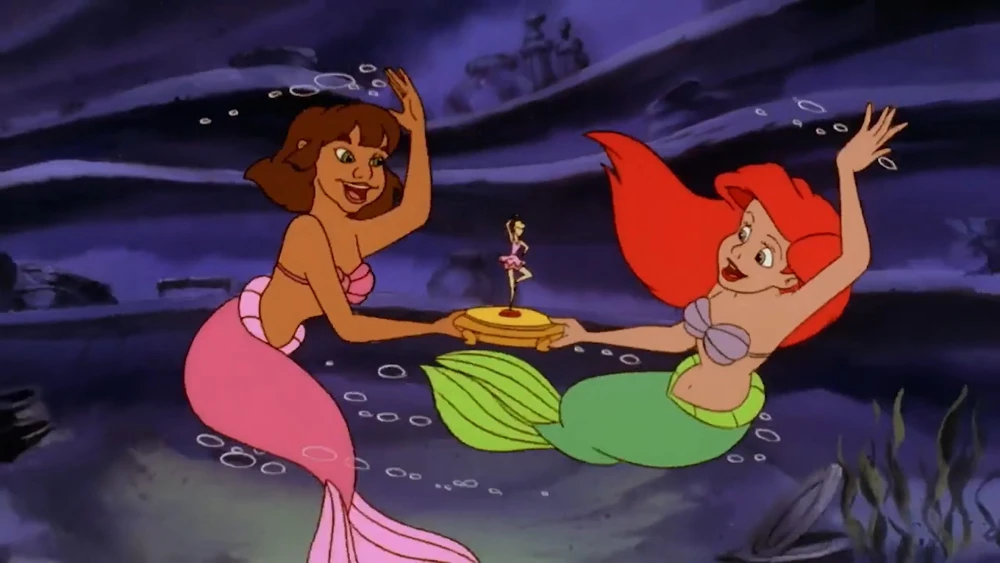Once upon a time, in a sea far, far away there was an animated kids’ show starring a famous red-haired mermaid. Yes, I’m talking about the 90s Little Mermaid animated show. While it wasn’t nearly as popular or iconic as the movie was, it did feature a recurring character that made its mark in my young, impressionable mind: Gabriella, the deaf Latina mermaid. Gabriella, who by the way was inspired by a real-life fan of the 1989 Little Mermaid animated film who sadly passed away, was not a main character in the show. In fact, she only appears once in season two and once again in season three. Those two appearances, though, were enough to make me realize how important inclusion and representation are when it comes to children’s media.
Gabriella was Ariel’s curious and inquisitive Latina friend (two things all little Latinas should be more of, tbh). She was a deaf mermaid who communicated exclusively in American Sign Language and was able to understand her speaking friends thanks to her lip-reading abilities. Her pal Ollie the octopus was always by her side, and in fact, he served as Gabriella’s interpreter, letting Ariel, Flounder, Sebastian, and the audience know what Gabriella had to say.

In her debut episode, Gabriella goes through a journey of self-discovery: after hearing Ariel sing about her desire to be a dancer with “two tails,” she realizes she wants to be able to sing, just like Ariel can. Both mermaids agree to go looking for the Magical Starfish, who supposedly can grant them their wishes. After swimming their way out of various dangers and troubles along the way, Gabriella and Ariel finally reach their destination, only to find out the Magical Starfish wasn’t really magical at all. While they’re disappointed, both young mermaids realize what they really wanted was to be able to express themselves – something they were always perfectly capable of doing, despite the limitations each of them had. They were always enough. When Ariel finally realizes this, she even says “We don’t need magic! We’ll make our own wishes come true!”
As a kid, I remember liking Gabriella’s character because she was like me (I, too, wanted to be a singer when I was little) or at least more like me than Ariel was. As an adult, I realize just how close to home Gabriella’s story is. Growing up Mexican and a girl was a beautiful experience, I’m not about to say it wasn’t, but I can definitely relate to Gabriella’s feeling of not being enough (or wanting to be different to fit into the world she lives in) and looking to the outside world for validation. I’m constantly reminded that, according to my small northern-Mexico town, I’m somehow “not enough” (not skinny enough; not “woman” enough for being 30, unmarried, and childless; not successful enough; not quiet and proper enough…).

Much like Gabriella, I sometimes feel the need to change myself and hope for a Magic Starfish to make me into what my community expects of me. But I’ve also come to realize I am enough as I am right now – and that’s why seeing diverse characters growing up is so important. It serves as a reminder that the people who look like us, speak like us, or even pray like us face challenges and situations like anyone else. And just like anyone else, we’re also perfectly capable of overcoming them. As an adult, I know I don’t need a Magic Starfish because I’m more than capable of singing, dancing, and being my own version of a successful Mexican woman, sin importar el “qué dirán.” As a child, I could’ve maybe used a reminder or two that my experience, feelings, and struggles were valid.
There’s been a lot of talk lately around who can or can’t be a mermaid, and the truth is, anyone can be a mermaid — that’s the beauty of fantasy and fiction! And The Little Mermaid animated series is proof of that. We all get to dream of becoming whatever our heart desires, no matter the color of our skin, where we were born, or whether or not we can sing and dance. All of our children should have characters they can relate to, look up to, and fall in love with. And, if those characters are more diverse than we were kids, that’s a good thing! We need more Gabriellas, not less.

